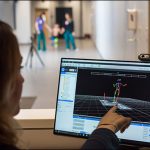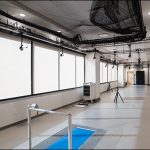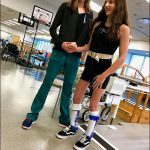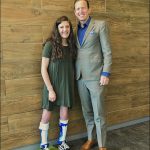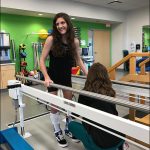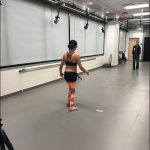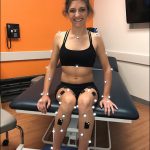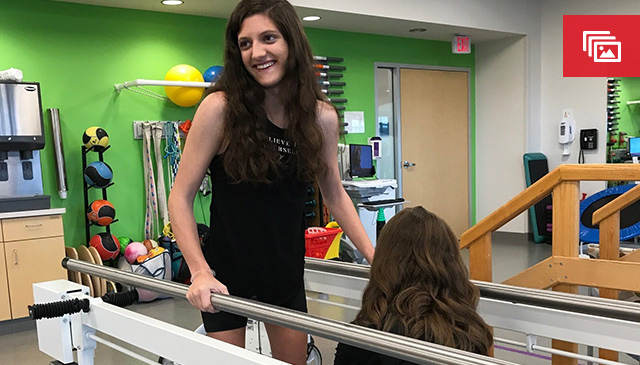
This past year, Texas Children’s Motion Analysis and Human Performance Laboratory, located at Texas Children’s Hospital The Woodlands, was awarded a prestigious accreditation from the Commission for Motion Laboratory Accreditation (CMLA) – an independent body established to enhance and standardize the clinical care of people with movement disorders.
The lab is now one of only 14 accredited labs in the nation and one of only three in Texas.
“This was an incredible accomplishment for our entire team and a major milestone for the entire Texas Children’s system,” said Dr. Eric Dugan, director of Texas Children’s Motion Analysis and Human Performance program.
Watch a video about the Motion Analysis Lab.
CMLA accreditation is a rigorous, often lengthy process and requires top-to-bottom documentation of everything a motion analysis lab does, how it’s done and the level of quality achieved. This includes evaluation of personnel, administrative structure, clinical and technical data collection methods, quality assurance procedures, and institutional policies. This data is then reviewed by a panel of CMLA experts in orthopedic surgery, physical medicine and rehabilitation, physical therapy, biomechanics, and other related disciplines.
“In early discussions with the CMLA, their estimated timetable for us, from the lab going online to accreditation, was about five years,” said Dugan. “We did it in 18 months, and were one of the fastest ever to receive accreditation.”
Every day, Texas Children’s is getting bigger and better. That’s because our leadership and world-class health care experts are always looking for ways to improve processes, to forge new paths in research, and to ensure an unmatched level of quality care for our patients. And it’s evident in our outcomes and in measures like our recent U.S. News & World Report rankings.
The CMLA accreditation was certainly a factor in the Division of Orthopedics rising five spots to become the No. 10 pediatric program in the country.
“There are so many things that go into the U.S. News rankings, but CMLA accreditation had a positive effect on our position because it helps us ensure we’re offering a full capacity of care for patients with movement disorders,” Dugan said.
Helping remove barriers
The Motion Analysis and Human Performance Laboratory provides the platform for an integrated approach to patient care. The foundational service for the lab is for neuromuscular or clinical gait patients with some form of neuromuscular disorder, such as cerebral palsy or spina bifida. However, lab capabilities are already being expanded to include a comprehensive sports medicine component. Two programs in early phases of implementation are running analysis – to determine any deficits in strength and mobility, or to identify mechanical issues that could lead to chronic injuries – and concussion management, which helps children avoid returning to play too early and experiencing another brain injury and also any possible musculoskeletal injuries that could result from concussion-related changes to postural control.
Clinical gait patients come to the lab as part of pre-surgical or pre-treatment planning to help multidisciplinary care teams determine the best path forward. The evaluation process is intensive and begins with a physical exam with a physical therapist (PT). In this approximately one-hour session, the PT assesses muscle tone, strength, range of motion and other functional measures to get a clear picture of the patient’s condition. A series of 2-D videos and photos are then taken to document standing posture and foot alignment. Patients are then “markered up” head to toe with 70 reflective spheres adhered at specific points on the body. This allows the team in the lab – typically a PT, PT tech and a biomechanist (human motion expert) – to capture a full biomechanical picture of the patient. These experts then work with colleagues in surgery and physical medicine and rehabilitation to analyze the data and develop a treatment plan that fits the needs of each individual patient – patients just like Hannah Deverse.
Hannah was born at 32 weeks, so her parents had been told to expect some developmental delays. However, when Hannah turned one, she still couldn’t sit up or crawl. Her body was stiff and she screamed in discomfort. A neurologist diagnosed her with cerebral palsy.
Over the course of her life, Hannah would need surgeries to alleviate tightness, improve flexion and correct structural deformities. But more than a decade ago, awareness and technology weren’t far along and her parents often felt they were flying in the dark.
“When you have to make difficult decisions about treatment without knowledge, you can feel lost,” said Jessica Deverse, Hannah’s mother. “That was how we felt before we experienced Texas Children’s motion lab. We had two surgeries before the lab was available and two after. We were much more confident with data from the lab. We were presented with multiple options and never felt pressured to do any of them. When we did make a decision, the team answered every single question we had, and we had a clear picture of what the process would be, from beginning to end.”
The data gathered in their initial lab session at Texas Children’s helped experts in pain management determine that Hannah would benefit from a special intrathecal pump to alleviate tightness in her body.
“Have you ever tried to stretch and you just couldn’t reach your toes? It was like that but all over my body for my whole life,” Hannah said. “After I got the pump, I felt like I was walking on clouds. I’d never felt that way before. I asked, ‘Is this how it’s supposed to feel?” because my whole life my body had been so tight.”
Lab analysis also allowed Hannah’s care team to make integral decisions about surgery. Initially it was thought she would need surgery on both knees. But because of the pump helping to control spasticity, the team changed course and decided to operate on only one knee, a surgery performed by Dr. Jeffrey Shilt, chief surgical officer at Texas Children’s Hospital The Woodlands and Texas Children’s chief of Community Surgery, and co-medical director of the Motion Analysis Lab.
“It’s really important that parents know just how much more confident you can feel about making a surgery or treatment decision after seeing and reviewing the data with the team from the motion lab,” Jessica said. “As parents we are often faced with making decisions that will impact the future wellbeing of our children. When you have a child with a disability, the weight of some decisions can be overwhelming because it has drastic lifelong implications. I wish everyone faced with these decisions had this information and this team to work with.”
When Hannah was a baby, her parents were told that she may never walk. Hannah’s proven detractors wrong. Today, she’s 16 years old and has her sights set on getting her driver’s license.
“I’m the only person in my group of friends who doesn’t have a license yet, which is hard on me!” she said. “But I know I’ll get there.”


